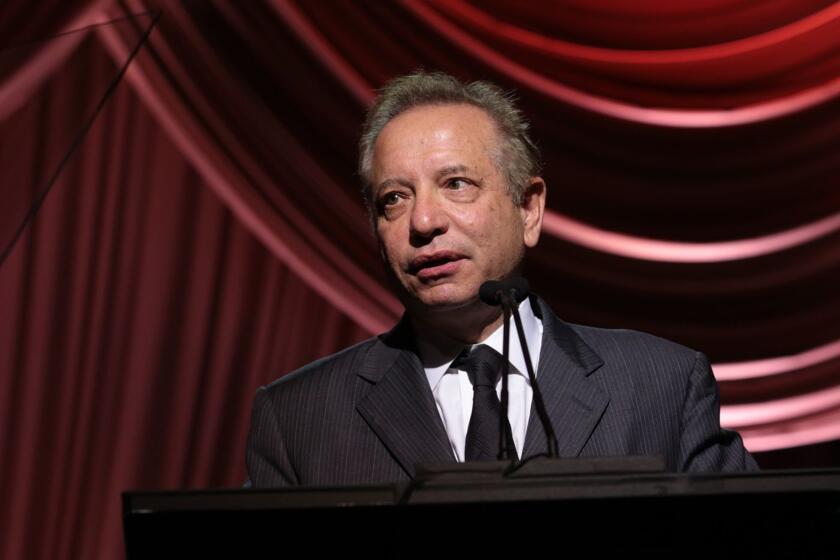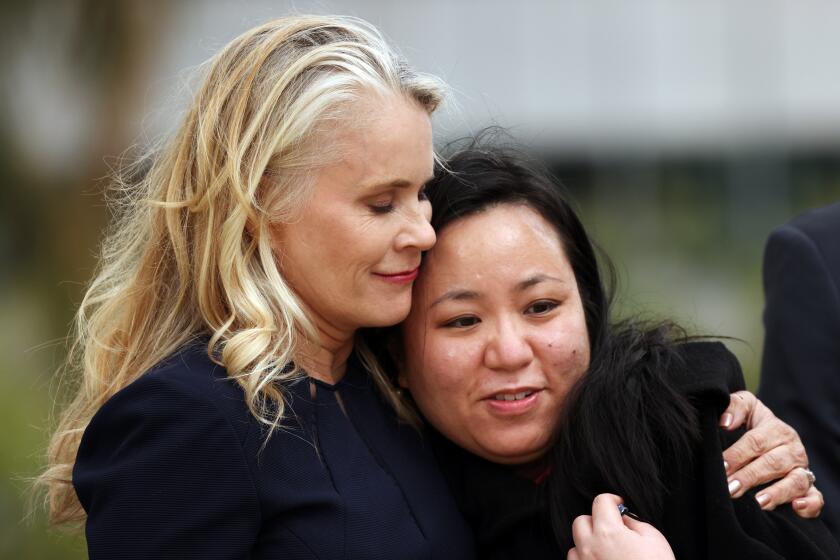Former USC campus gynecologist’s accusers call for investigation of top university officials
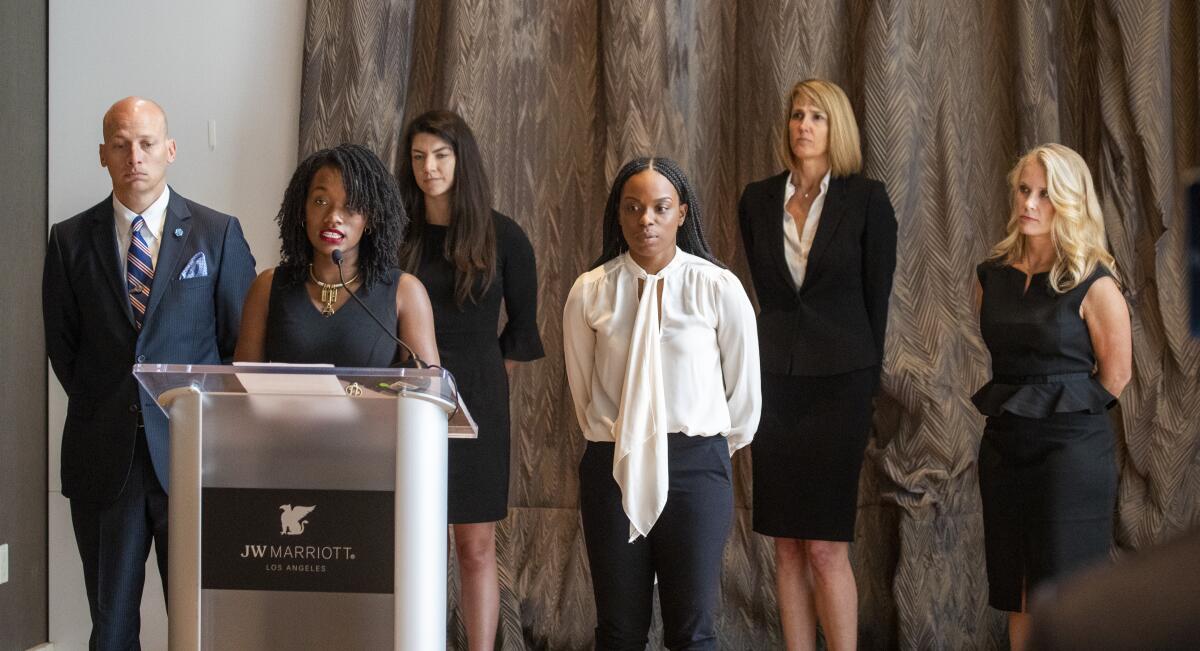
- Share via
In their sprawling sexual assault inquiry focused on USC, Los Angeles police detectives traveled the country to interview scores of people about a campus gynecologist accused of abusing young women for decades, a scandal that eventually cost C.L. Max Nikias the school presidency and the university more than $1.1 billion in legal settlements.
But there was at least one prominent person detectives never approached for an interview, The Times has learned: Nikias himself.
USC entered into a secret legal settlement with the family of a young woman who had a drug-fueled relationship with the university’s medical dean, Carmen Puliafito, The Times has learned.
Many of Dr. George Tyndall’s accusers have expressed outrage over USC’s handling of complaints against the physician. They are demanding an investigation into whether Nikias or other administrators sought to cover up the allegations against the doctor, something Nikias has denied doing.
“I would like to see a real investigation,” said Allison Rowland, one of hundreds of women who received money from lawsuit settlements USC has agreed to pay Tyndall’s accusers. “If the district attorney isn’t willing to do it, then the state attorney general’s office should — and if the A.G. won’t do it, then a special prosecutor.”
But several legal experts said the need for an investigation into whether administrators knew of sexual abuse allegations and failed to act should have been obvious once prosecutors decided they had enough evidence to charge Tyndall with multiple sex crimes. Some of the gynecologist’s former patients also questioned whether USC’s power and influence insulated university administrators from a criminal inquiry.
In two high-profile sexual assault cases involving former Penn State football coach Jerry Sandusky and former Michigan State University physician Larry Nassar, authorities broadened their investigations to examine how university administrators responded to complaints about the abuse.
“If you’re not looking, you’re never going to find anything,” said Audry Nafziger, who was treated by Tyndall in 1990 and has worked for many years as a sex crimes prosecutor for the Ventura County district attorney’s office. “Somebody needs to look into this. We need to bring full accountability and justice. Why is USC different from Penn State? Why is it different from Michigan State?”
Those wider inquiries led to criminal charges against the presidents of both schools. A judge later dismissed the charges against former Michigan State President Lou Anna Simon, who was accused of lying to investigators in the Nassar case, though the attorney general in that state is appealing the dismissal. Former Penn State President Graham Spanier recently served a two-month prison sentence for not reporting to police or child welfare officials an allegation that Sandusky molested a child.
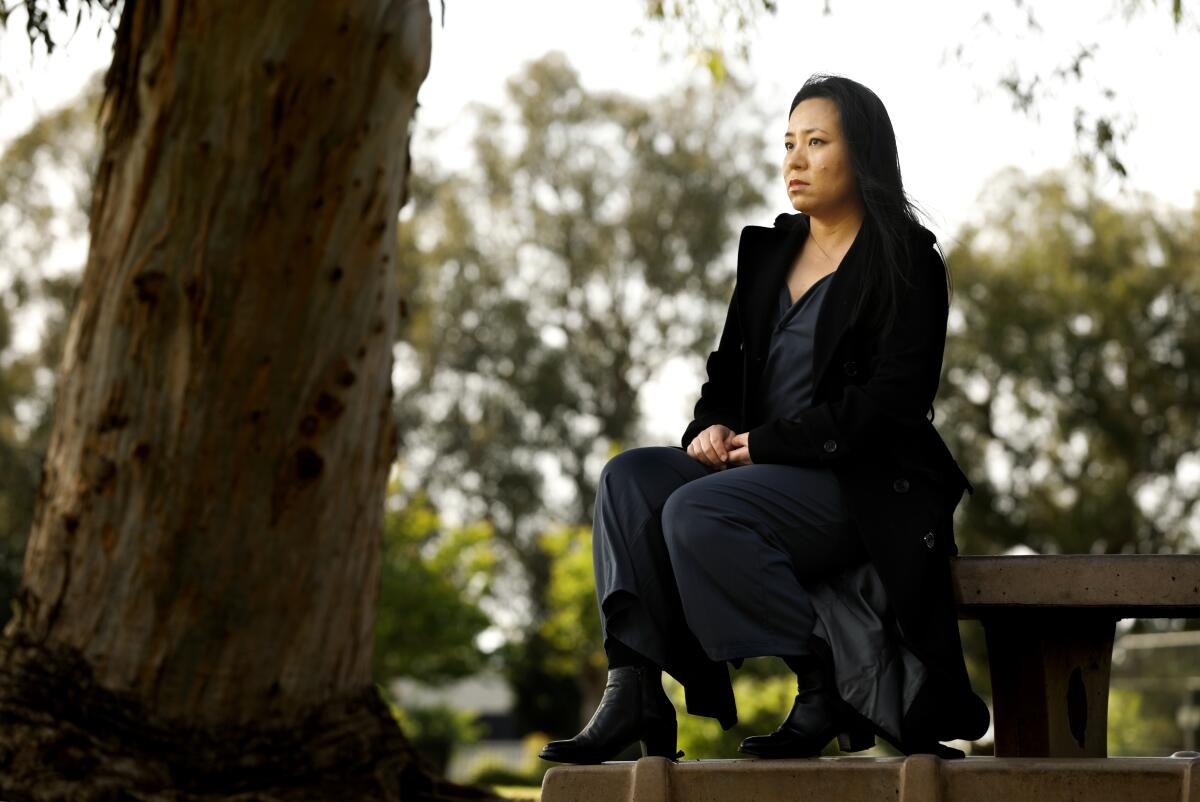
Jackie Lacey, who was Los Angeles County district attorney when Tyndall was charged in 2019, defended her office’s handling of the case. In a recent interview with The Times, she said prosecutors never received any evidence that USC administrators “aided and abetted” alleged crimes by Tyndall.
When pressed on comparisons to the wider investigations at Michigan State and Penn State, and the apparent lack of any inquiry into whether USC administrators engaged in a cover-up, Lacey said: “In hindsight, as you present it in the way you present it, sure, I would see if there was some way we could have looked further for evidence…. I would have.”
The complaints against Tyndall began in the 1990s. One of the earlier allegations was that he was improperly photographing students’ genitals; he said the photos were for medical purposes. In the years that followed, patients and nursing staff members accused him repeatedly of “creepy” behavior, including touching women inappropriately during pelvic exams and making sexually suggestive remarks about their bodies.
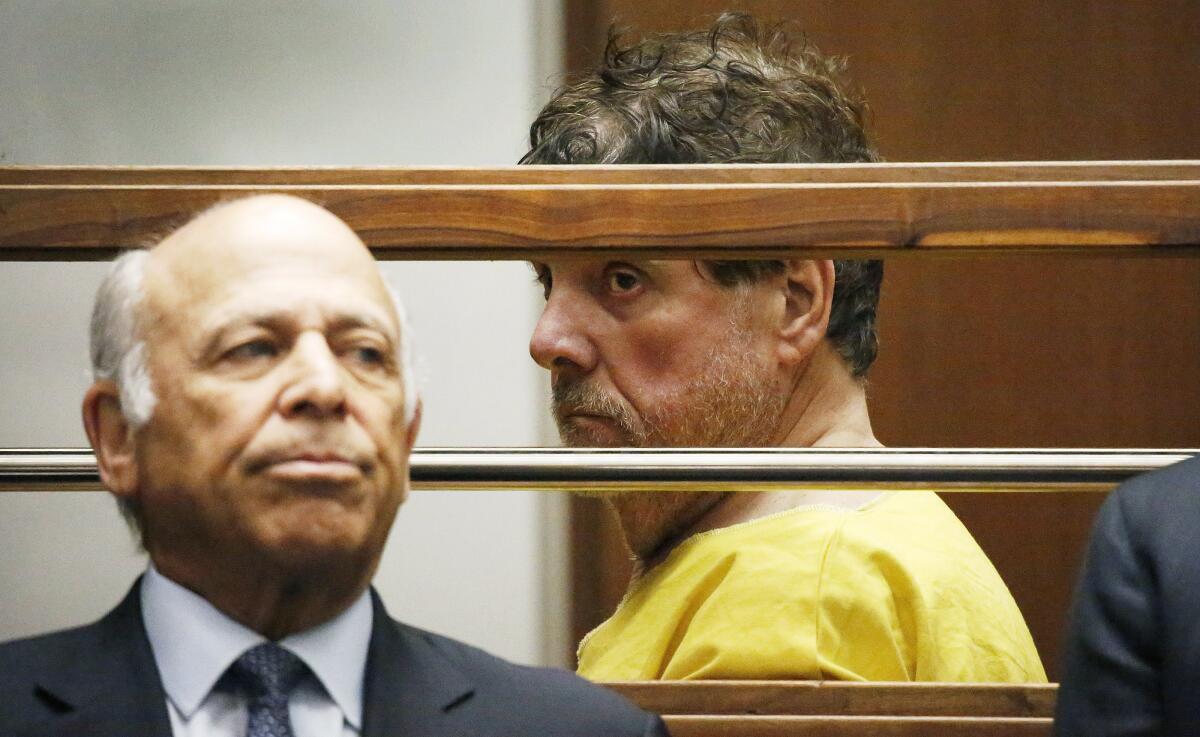
In 2016, a frustrated nurse went to the campus rape crisis center to complain about Tyndall, prompting the university to suspend the doctor. More than 200 photographs and slides of female genitals were found in his office. Medical experts hired by USC determined that many of his practices, including his pelvic exams, were outside the scope of medical practice, and the university concluded that some amounted to sexual harassment of students. Tyndall was allowed to resign quietly with a financial payout.
USC did not report Tyndall to the Medical Board of California until after The Times began contacting university employees about the doctor. Nikias stepped down as president amid an uproar after The Times’ investigation detailed decades of allegations against Tyndall.
A U.S. Department of Education investigation triggered by the newspaper’s reporting found that the USC general counsel’s office and Office on Equity and Diversity had been informed in 2010 of a patient’s complaint that Tyndall examined her with his ungloved fingers, the type of alleged conduct that led the district attorney’s office to file criminal charges against him years later. Similar complaints were made to the administration in 2013 and 2016. The Department of Education found the university failed to properly investigate.
Tyndall, 74, faces more than 30 charges accusing him of sexually abusing patients at the campus health center between 2009 and 2016. He has pleaded not guilty.
Nikias, who was USC president from 2010 to 2018, declined to be interviewed by The Times but provided written answers to questions submitted through his attorney.
Asked about the calls for a criminal inquiry of the school’s former leaders, he said that detectives had never approached him for an interview and that he knew of no subpoenas or search warrants served on the university by criminal investigators.
“I understand the alleged victims’ anger,” he wrote. “I am also very angry and remain very angry that Dr. Tyndall was allowed to engage in this conduct for almost 30 years. However, I do not believe that the actions of the USC administrators warrant any such investigation.”
He said he first heard Tyndall’s name in December 2017 when he was told that the doctor had “engaged in harassing comments” and was no longer at the university. In February 2018 — after The Times began its investigation — Nikias said he learned in a briefing that the university had hired medical reviewers who concluded that Tyndall’s physical exams did not meet practice standards and that he had made discriminatory and sexually inappropriate comments. Nikias said he instructed the university to report Tyndall to the medical board.
USC’s $1.1 billion settlements to former patients of Dr. George Tyndall was the largest sex-abuse payout in education history. Behind the numbers lies a lopsided economic landscape.
He said he first learned about allegations of sexual abuse in May 2018 from questions The Times asked the university about Tyndall. In response, Nikias said, he told his top administrators that the university should notify the district attorney’s office and go public with the allegations so that Tyndall’s former patients could raise complaints.
Dist. Atty. George Gascón, LAPD Chief Michel Moore and state Atty. Gen. Rob Bonta declined through spokespeople to be interviewed for this article, and their representatives did not answer several written questions submitted by The Times.
The investigation of Tyndall, conducted by Los Angeles Police Department robbery-homicide detectives, was one of the largest sex crimes inquiries in the city’s history. The former and current lead investigators either could not be reached for comment or declined to be interviewed.
A detective who worked on the case said he knew of no high-ranking USC administrators, Nikias included, who were questioned about how they or the university handled complaints about Tyndall. The detective was not authorized to speak publicly and thus requested anonymity.
Women who received payments in the Tyndall settlements have alleged Lacey’s ties to USC influenced the decision of her office not to investigate the conduct of Nikias and other administrators, including then-Provost Michael Quick, who declined an interview request from The Times. Lacey graduated from USC’s Gould School of Law, held her initial swearing-in as district attorney at the school’s Galen Center — a ceremony that featured Nikias as a speaker — and has participated in university events.
Lacey, who was defeated by Gascón in the November election, said her USC connections had no effect on the investigation. She said she did not direct the inquiry and never suggested it should be limited to Tyndall. Asked whether she should have recused herself to eliminate the appearance of any conflict, she said, “I don’t think so.”
“I was not part of any elite group or anything like that with regard to the university,” she added. She said her relationship with Nikias was “very formal…. We were not close. We were not buddies.”
In his statement, Nikias said he met Lacey on occasion but “never had a business or social relationship” with her.
Joshua Ritter, a former deputy district attorney under Lacey, said he believed she is a “woman of integrity” who was not swayed by her USC connections, but he added that “political considerations” often influenced the office’s decision on whether to pursue prosecutions involving powerful institutions such as USC.
“At the very minimum, interviews should have been conducted” of USC administrators, he said.
Joseph Giacalone, a retired police detective who is a professor at the John Jay College of Criminal Justice in New York, said Lacey’s considerable ties to USC should have prompted her to immediately remove herself from any role in the investigation. “You put yourself on Mars — that’s how far you distance yourself from this,” he said.
Giacalone also said it should have been routine for investigators to at least speak to higher-ups at USC. As a detective, Giacalone said, he would want to know if any administrators violated laws requiring them to report to authorities any knowledge they had of allegations that minors were molested by Tyndall.
“This is like ‘Criminal Investigation 101,’” Giacalone said.
Legal experts said detectives could have examined whether administrators broke other state laws, including obstructing law enforcement and destroying or concealing evidence during an investigation.
California law requires so-called mandated reporters at secondary education institutions to alert authorities to suspected sexual abuse of a child. At least one of the women named among Tyndall’s victims in the criminal case was 17 at the time, and several plaintiffs in the lawsuits filed against USC were legal minors when Tyndall allegedly abused them. USC did not answer a question about whether Nikias, Quick and two other top administrators at the time of the scandal were mandated reporters under the law.
For women who received a settlement payment in the Tyndall matter, the anger and frustration over the absence of a wider investigation are compounded by the fact that Nikias and Quick still hold professorships at the university. Nikias is also a life trustee on the USC board.
“It sickens me for them to still be working there,” said Riley Ransom, a 2018 graduate.
Another of the women in the Tyndall case, Ja’Mesha Morgan, who earned a law degree from Gould, said keeping Nikias and Quick on campus “really shows that USC has no intention of being accountable.”
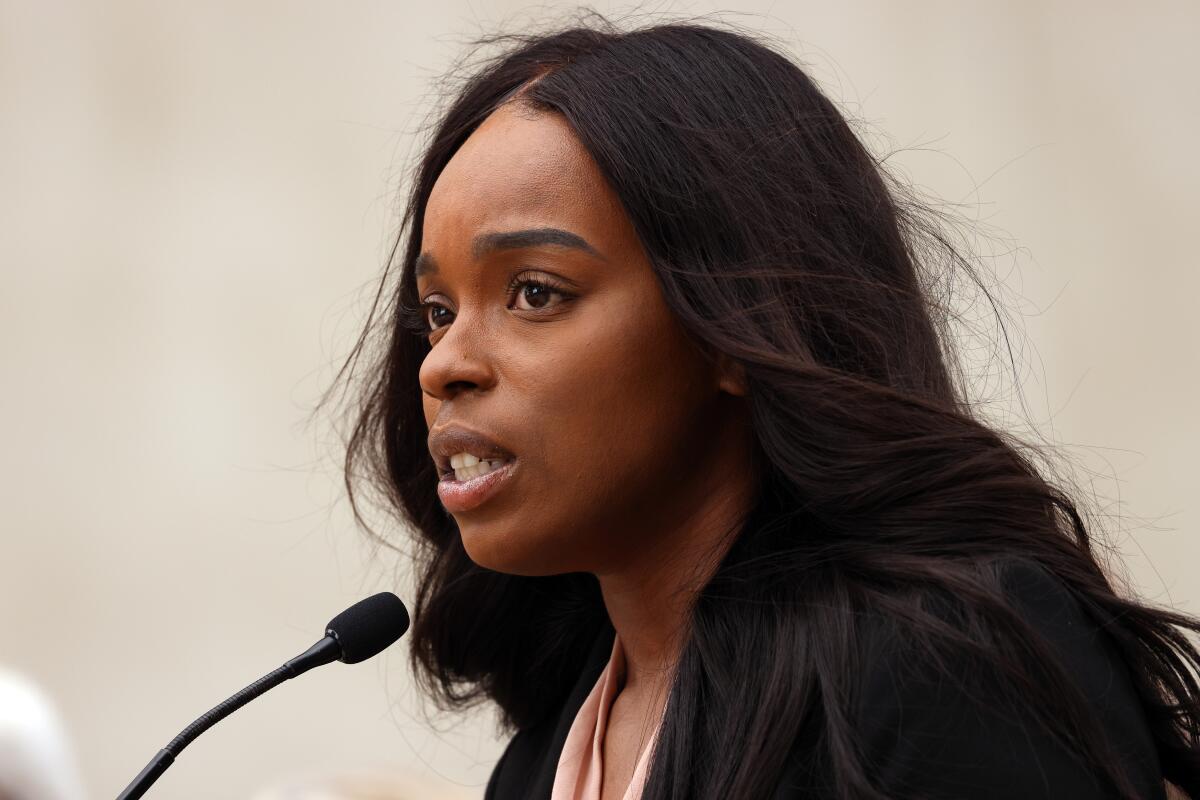
Jane Junn, a USC political science and gender studies professor and associates chair in social science, said a fuller investigation by the district attorney’s office into how administrators dealt with the Tyndall allegations could help restore broken trust in the university’s leadership. “You can’t heal the wound without knowing how it got there,” she said. “And you can’t avoid another injury.”
Ariela Gross, a Gould law professor, co-founded a faculty group that pushed for reforms after The Times’ disclosures on Tyndall. Endorsing the calls for a deeper inquiry, she said: “I certainly think anyone who has the authority to do so should look further, especially when it comes to criminal matters involving George Tyndall. It surprises me there wasn’t a more thorough investigation.”
Lucy Chi, who has accused Tyndall of abusing her, agreed. “USC can’t continue to operate with so much impunity,” she said. “It’s just a culture. They’re so well connected that they think they can do whatever they want.”
John Manly, the lead attorney for Chi and the other plaintiffs in the largest of the Tyndall settlements — representing $852 million of the total $1.1 billion the university has agreed to pay — said the failure to investigate how administrators handled the many complaints about the doctor that were made over three decades amounted to a “protective shield in the form of the district attorney’s office” for Nikias and other USC leaders.
A USC grad himself, Manly had called on the state attorney general’s office three years ago to take over the Tyndall investigation. He said the office never responded.
In emailed responses to The Times’ queries about a potential criminal investigation of USC administrators, the attorney general’s press office repeatedly referred the newspaper to the district attorney’s office or the Medical Board of California. The emails to The Times were signed “press office,” without a person’s name attached, and the office did not respond to questions of who wrote them.
Manly said it was “shocking” that the attorney general’s office did not investigate, and he noted that both the state attorney general and the county district attorney are elected officials.
“When USC pays over a billion dollars, that means somebody at the institution screwed up,” he said. “You might want to look into that. All these woke politicians bury their heads in the sand because of USC. This is just politics, dirty politics.”
More to Read
Sign up for Essential California
The most important California stories and recommendations in your inbox every morning.
You may occasionally receive promotional content from the Los Angeles Times.
